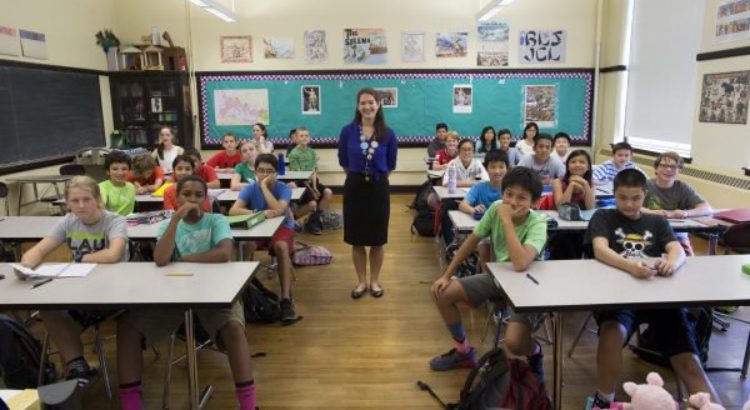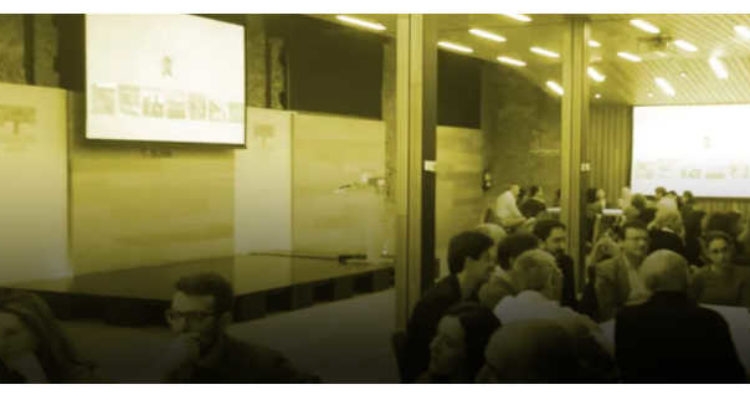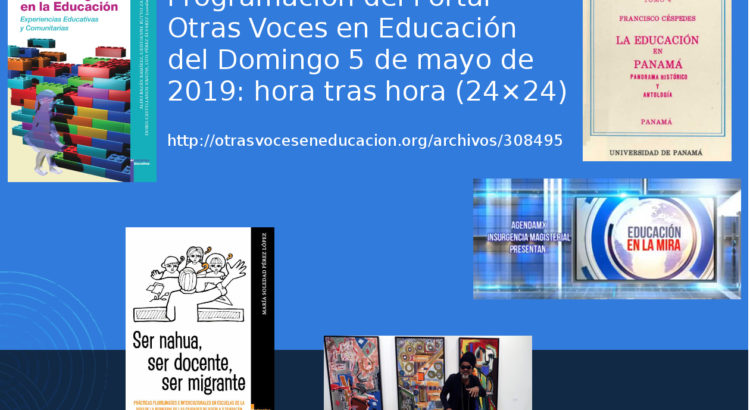By: Gerard Tousand Robinson.
Education serves as a principal driver of economic growth and mobility in the United States. This is why many scholars, lawmakers, nonprofit organizations and entrepreneurs focus on this area. As research on the topic indicates, completion of high school, postsecondary education or both has significant potential to positively impact individual and societal prosperity. Yet before a student completes high school — and at least 85% did in 2017 — we must consider the other factors at play for her along the way: money and how it is invested in education, the parenting gap, educator recruitment and retentionprograms, public and private choice offerings, and the use of litigation to achieve equal educational opportunity.
Teacher Elizabeth Moguel poses for a photograph with her seventh grade Latin class at Boston Latin School in Boston, Massachusetts September 17, 2015. REUTERS/Brian Snyder
Embedded in any discussion about education and opportunity is student learning. One tool to gauge student progress over time is the National Assessment of Educational Progress (NAEP), referred to as the Nation’s Report Card. Since 1969, NAEP has administered the largest national assessment of subject-matter achievement for a representative sample of students in grades 4, 8, and 12 in the United States. NAEP uses the same tests across states and districts, which includes public (traditional, charter, and magnet) and private school students. Given the reach of NAEP and its recognition as a measure of our children’s academic vitality, we should analyze the results to identify our strengths and areas for improvement.
The percentage of students who scored at or above proficient on the most recentassessment of NAEP subjects is not impressive. This quantifiable deficiency is evidence of the necessity for research and reform surrounding educational systems geared towards the needs of individual communities.
Public School Students Only
| Subject | Grade 4 | Grade 8 | Grade 12 |
| Civics | 26 | 23 | 23 |
| Economics | – | – | 41 |
| Math | 39 | 32 | 23 |
| Reading | 35 | 33 | 36 |
| Science | 37 | 33 | 21 |
| Technology & Engineering Literacy | – | 45 | – |
| US History | 19 | 14 | 11 |
| Writing | 27 | 26 | 25 |
Private School Students Only
| Subject | Grade 4 | Grade 8 | Grade 12 |
| Civics | 35 | 38 | 38 |
| Economics | 62 | ||
| Math | – | – | – |
| Reading | – | – | 54 |
| Science | 48 | 43 | |
| Technology & Engineering Literacy | – | 60 | – |
| US History | 31 | 31 | 17 |
| Writing | 39 | 41 | – |
Creating meaningful change to the current state of affairs in K-12 education initially requires a thorough understanding of the factors underlying the exclusions and limitations that families confront in search of quality education for their children and themselves, particularly in fragile communities. The Center for Advancing Opportunities (CAO) defines these as places characterized by high proportions of residents struggling in their daily lives and possessing limited opportunities for social mobility. Following awareness of these deep-seated and enduring conditions, the next step must be to study the practices and systems through which we can close the opportunity gap.
In April 2019, the CAO released its State of Opportunity in America Report in partnership with Gallup, the Charles Koch Foundation, and Koch Industries. The report contains information about education (among other topics) gathered from 5,784 people living in some of the most challenging socioeconomic zip codes in 47 states, including residents in the northern and central regions of Appalachia.
A sample of those living in fragile communities includes the following: 71% are people of color and 29% are white; 53% have a household income of $34,999 or less, with the majority earning under $24,000 a year; 51% rent their place of residence; and 13% do not have a high school diploma — though 12% have earned a bachelor’s degree or more. Despite economic challenges, many people in fragile communities want their children and themselves to have access to a quality education.
One intention of the CAO report is to present a more nuanced understanding of the barriers to opportunity burdening those living in fragile communities as they relate to education. We accomplished this goal by asking the people living closest to the issue what they think.
We asked individuals in fragile communities several questions about K-12 and higher education. We also gathered data from 1,683 people in Birmingham, Alabama; Fresno, California; Chicago, Illinois; and the northern and central Appalachian region to learn how residents in low-income urban and rural areas view their own circumstances and the options available to them. These communities were selected in part because they represent unique geographic regions in the US, each with its own social, economic and historical influences, as well as different racial and ethnic compositions.
Demographic Characteristics of Fragile Community Residents
| Education | Total (N=5,784) | Birmingham(N=696) | Chicago(N=569) | Fresno(N=751) | Appalachia(N=455) |
| Less than high school | 13% | 11% | 12% | 12% | 12% |
| High school graduate | 33% | 35% | 35% | 30% | 35% |
| Technical/Vocational school | 12% | 10% | 10% | 13% | 14% |
| Some college but no degree | 20% | 21% | 16% | 20% | 19% |
| Associate degree | 9% | 14% | 7% | 6% | 12% |
| Bachelor’s or more | 12% | 9% | 21% | 19% | 9% |
Note: 2017 data used for income results. Education and race/ethnicity data from Gallup general population survey, December 2018.
Overall, an analysis of the survey results found the following about the quality of local K-12 public schools, higher education, and confidence about career goals.
How satisfied or dissatisfied are you with the quality of public K-12 schools in your area?
Chicago
35% responded as extremely satisfied or satisfied and 42% were dissatisfied or extremely dissatisfied.
Appalachia
65% responded as extremely satisfied or satisfied and 20% were dissatisfied or extremely dissatisfied.
Birmingham
32% responded as extremely satisfied or satisfied and 37% were dissatisfied or extremely dissatisfied.
Fresno
44% responded as extremely satisfied or satisfied and 33% were dissatisfied or extremely dissatisfied.
What these findings show are significant discrepancies in levels of public satisfaction with the quality of public K-12 schools that vary from one community to the next. Strikingly, individuals in historically disadvantaged communities indicated satisfaction. However, the%age of those dissatisfied remains substantial.
How important is a college education today?
At least 62% of all people in fragile communities reported that college is very important. By subgroup, 45% of whites said college is very important compared to 69% of blacks and 70% of Hispanics. More women than men believe a college education is very important at 69% to 55%, respectively.
How satisfied are you with the availability of high-quality community college and job training programs?
Overall, 42% of people in fragile communities are extremely satisfied or satisfied with the availability of high-quality community college programs in their area, and 28% say the same for job training programs.
How confident are you in your ability to achieve career goals you set for yourself — very confident, confident, somewhat confident or not at all confident?
Each percentage represents people who responded “very confident” and “confident” by education level:
Less than high school = 54% of the people in this cat
Technical/Vocational school = 64%
Some college but no degree = 67%
Associate degree = 73%
Bachelor’s or more = 80%
For individuals residing in fragile communities, education not only allows for increased opportunity — entrepreneurial and otherwise — but has also been correlated with elevated well-being and optimism scores.
Altogether, these figures supply fresh evidence that reflects the major obstacles standing in the way of many families in search of high-quality public schools, higher education and job training. A heightened focus on access to education and fluctuations in the caliber of education across communities has yielded important insights about the sources of particular educational disparities. In order to produce effective amendments within this arena, research-based solutions are necessary. Professors such as Kathaleena Monds, director of the Center for Educational Opportunity at Albany State University, are playing a role in creating a foundation base for an informed understanding of community and individual needs that must be applied and consistently reassessed to incorporate into impactful reforms.
By asking people in fragile communities and scholars alike “what works, why, why not and for whom?” we improve our understanding about the delivery of teaching and learning opportunities, and provide research that can strengthen our country’s commitment to advancing opportunity for all people.
Source of the article: https://www.aei.org/publication/education-for-people-in-fragile-communities/










 Users Today : 62
Users Today : 62 Total Users : 35459528
Total Users : 35459528 Views Today : 90
Views Today : 90 Total views : 3417848
Total views : 3417848